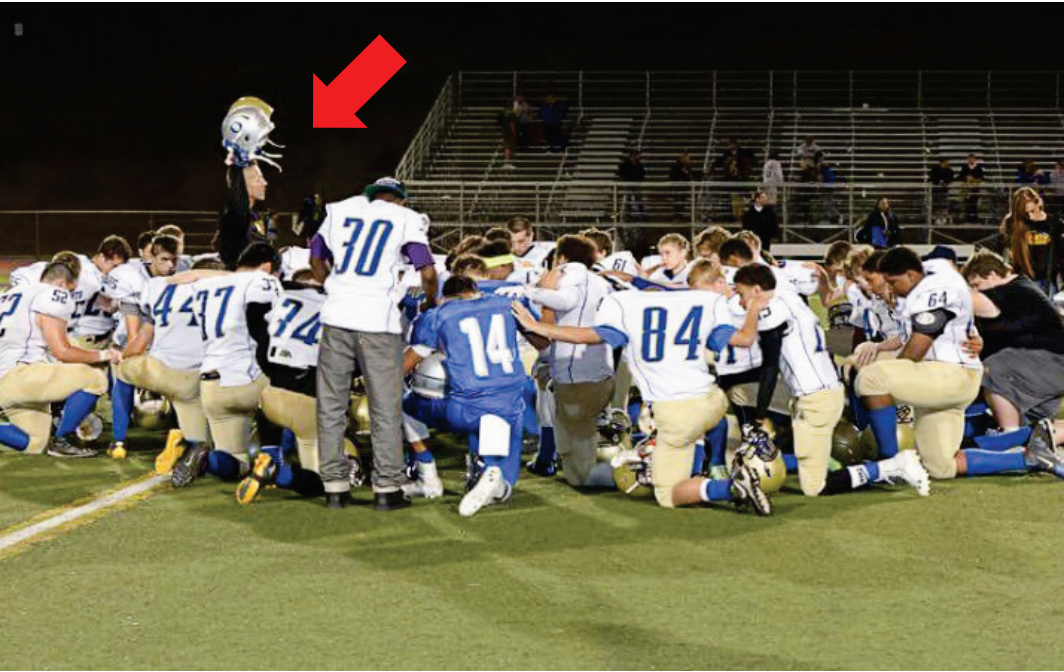
CNN, 27 Jun 2022: Supreme Court further erodes separation between church and state in case of praying football coach
No surprise here; the current SCOTUS has been consistently favoring religious interests in every possible circumstance. At least Christian ones! Plus, Robert Reich, and what Thomas Jefferson thought about Constitutional originalism.
\
Slate, Mark Joseph Stern, 27 Jun 2022: Supreme Court Lets Public Schools Coerce Students Into Practicing Christianity, subtitled, “The conservative supermajority continues to repeal the separation of church and state.”
Its Monday decision in Kennedy v. Bremerton School District overruled a half-century of precedent to elevate the rights of public school officials over students. The ruling will allow these officials to engage in coercive sectarian prayer on the job. Justice Neil Gorsuch’s 6–3 decision is another maximalist attack on the separation of church and state, stripping students of their First Amendment freedom against religious indoctrination. His opinion also embraces a false narrative of faith-based persecution, illustrating yet again that this court will manipulate facts to reach its desired outcome.
You can bet that public opinion and judicial rulings would have been quite different if it had been a Muslim coach leading his players to bow toward Mecca. You’re thinking, but that wouldn’t happen in America, we’re all Christians here. Nope. And, that’s missing the point.
\
Vox, Ian Millhiser, 27 Jun 2022: The Supreme Court hands the religious right a big victory by lying about the facts of a case, subtitled, “Kennedy v. Bremerton School District is a big victory for the religious right, but only because Gorsuch misrepresents the facts of the case.”
But Justice Neil Gorsuch’s opinion for himself and his fellow Republican appointees relies on a bizarre misrepresentation of the case’s facts. He repeatedly claims that Joseph Kennedy, a former public school football coach at Bremerton High School in Washington state who ostentatiously prayed at the 50-yard line following football games — often joined by his players, members of the opposing team, and members of the general public — “offered his prayers quietly while his students were otherwise occupied.”
[…]
But Justice Neil Gorsuch’s opinion for himself and his fellow Republican appointees relies on a bizarre misrepresentation of the case’s facts. He repeatedly claims that Joseph Kennedy, a former public school football coach at Bremerton High School in Washington state who ostentatiously prayed at the 50-yard line following football games — often joined by his players, members of the opposing team, and members of the general public — “offered his prayers quietly while his students were otherwise occupied.”
After games, Kennedy would also walk out to the 50-yard line, where he would kneel and pray in front of students and spectators. Initially, he did so alone, but after a few games students started to join him — eventually, a majority of his players did so. One parent complained to the school district that his son “felt compelled to participate,” despite being an atheist, because the student feared “he wouldn’t get to play as much if he didn’t participate.”
See photo above, from the Slate article.
\\
Robert Reich, on Facebook:
In 1951, I was cast as Baby Jesus in my school’s Christmas show. As a 5-year-old boy from a Jewish family, I felt lost and vulnerable.
Today, after SCOTUS’ ruling in favor of the football coach who led his players in prayer, I feel it all over again.
\\
Via Fb,
Governing, Clay S. Jenkinson, 30 May 2021: America’s Constitution in 2021: What Would Thomas Jefferson Do?
Subtitled: “Jealously guarded as the country’s most sacred text, the highest law in the land is an artifact of history even as competing forces put demands on it to guide the country into the future.”>
Thomas Jefferson warned us not to regard the Capital C Constitution as sacred writ. On July 12, 1816, he wrote, “Some men look at constitutions with sanctimonious reverence and deem them like the ark of the covenant, too sacred to be touched. They ascribe to the men of the preceding age a wisdom more than human, and suppose what they did to be beyond amendment.” Jefferson believed that a dynamic society like ours needed periodic constitutional revision lest it be suffocated by an out-of-date social contract. “Laws and institutions must go hand in hand with the progress of the human mind,” he wrote. “We might as well require a man to wear still the coat which fitted him when a boy, as civilized society to remain ever under the regimen of their barbarous ancestors.” Jefferson’s “solution” to the problem of a claustrophobic constitution was to tear it up once every nineteen or twenty years and start again. “The earth belongs to the living generation,” he declared to his closest friend James Madison, who was both impressed and aghast.





